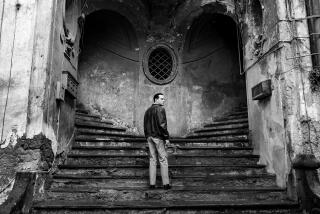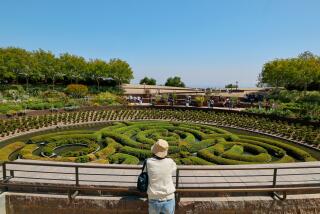PAINT IT BLACK : Smokestacks Belching Dark Smoke Into the Mediterranean Sky? Memorable, Thinks the Author, and Exceedingly Beautiful.
“Your genuine traveler,” wrote the English author Aldous Huxley in 1924 (in an essay rhetorically titled “Why Not Stay Home?”), “is so much interested in real things that he does not find it necessary to believe in fables. He is insatiably curious, he loves what is unfamiliar for the sake of its unfamiliarity, he takes pleasure in every manifestation of beauty.”
These words seem to define Huxley’s own reactions to a sight he encountered unexpectedly on the Italian island of Elba--reactions he recorded in another essay of the same period, called “Portoferraio.” (Both appear in the collection “Along the Road; Notes and Essays of a Tourist,” available in a reprint edition from Ecco Press and in a new British edition published by Flamingo.) Elba is a tiny island, covering about 86 square miles and located about six miles off the coast of Tuscany, southwest of Livorno. It was famous in the ancient world for its deposits of iron ore (which literally colored Huxley’s experience of it ) , but, of course, it is best known to us today as the place to which Napoleon was exiled after his first abdication in 1814. Portoferraio, which means “ironworker’s port,” is the island’s main town, and it was here that Napoleon lived, in the Villa dei Mulini.
Huxley, who was born a century ago this year and who died in his Hollywood home on Nov . 22, 1963 (a day on which the world was occupied with a more famous death), is best remembered for his satirical fantasy “Brave New World” and for such other novels as “Crome Yellow,” “Antic Hay,” “Island” and “Point Counter Point.” It is perhaps worth remembering, though, in light of the perceptual leaps and artistic associations he summons up in the passage that follows, that--years after writing his travel sketches--he became a pioneering experimenter with LSD and wrote two highly personal and philosophical books on the subject, “The Doors of Perception” and “Heaven & Hell.” *
The sky was Tiepolo’s palette. A cloud of smoke mounted into the blue, white where it looked toward the sun and darkening, through the color of the shadowed folds in a wedding gown, to gray. In the foreground on the right a tall pink house went up, glowing like a geranium, into the sunlight. There was the stuff there for a Madonna with attendant saints and angels; or a scene from Trojan history; or a Crucifixion; or one of the little amours of Jupiter Tonans.
The earth was Mediterranean--a piece of the Riviera completely surrounded by water. In a word, Elba. The hills dived down into a handsomely curved bay, full of bright, staring blue sea. On the headland at one end of the bay Portoferraio was piled up in tiers of painted stucco. At its feet lay a little harbor bristling with masts. A smell of fish and the memory of Napoleon haunted the atmosphere inveterately. Conscience and Baron Baedeker had told us that we ought to visit Napoleon’s house--now very suitably, a natural history museum. But we had hardened our hearts and would not go. It is very unpleasant not to have done one’s duty. “How tedious is a guilty conscience,” says the Cardinal in the “Duchess of Malfi.” He was quite right. We had walked the blazing streets groaning under conviction of sin.
And then, passing through a gateway in the walls of the old town, we found ourselves confronted by a scene that entirely relieved us of all our sense of guilt. For we were looking at something compared with which a house full of Napoleonic souvenirs was so obviously second-rate and dull that our rebellion against Baedeker ceased to be criminal and became positively meritorious.
Below us, on the farther side of a blue inlet of the sea, and with the mountains behind it, lay a little piece of the Black Country. In the midst stood a group of blast furnaces with three huge chimneys rising from beside them like the bell towers of a cathedral. To the right of them were five or six more chimneys. Three huge cranes were perched at the water’s edge, and an iron bridge led from the wharves inland to the furnaces. The chimneys, the cranes, the furnaces and buildings, the heap of rubbish, the very ground in this little area between the Mediterranean and the mountains--all were soot-black. Black against the sky, black against the golden-glaucous hills, blackly reflected in the shining blue water.
I should have painted the scene if I had known how. It was exceedingly beautiful. Beautiful and dramatic too. The mind delights in violent contrasts. Birmingham is frightful enough where it is, its body in Warwickshire and its sooty tentacles stretching out across the undulating land into Stafford. But set it down in Sicily or on the shores of Lago Maggiore and its frightfulness becomes at once more painfully apparent. In Warwickshire it is a full-length sermon on civilization, but one sleeps through sermons. Beside the Mediterranean it becomes the most bitingly memorable of epigrams. Moreover, the actual Birmingham of Warwickshire is too large to be taken in as a whole. This single piece of blackness between the blue sky and the blue sea was compactly symbolic. And because the sky and the grass were still visible all around it, the contest between industrialism and the natural beauties of the earth was much more vividly realized than where, as in the great towns of the north, industrialism has completely triumphed and one is not even aware of the existence of what has been conquered.
We stood for a long time, watching the smoke from the chimneys as it mounted into the still air. White gauze; white satin, glossy or shadowed; feathery gray--Tiepolo’s angels hovered; and the blue sky was the Madonna’s silken robe; and the tall pink house on our right was the color of one of those very handsome velvets to which, in the paradise of the last of the Venetians, the blest are so excusably partial.
*
(copyright) The Aldous Huxley Literary Estate. Used by permission.
More to Read
Sign up for our Book Club newsletter
Get the latest news, events and more from the Los Angeles Times Book Club, and help us get L.A. reading and talking.
You may occasionally receive promotional content from the Los Angeles Times.







